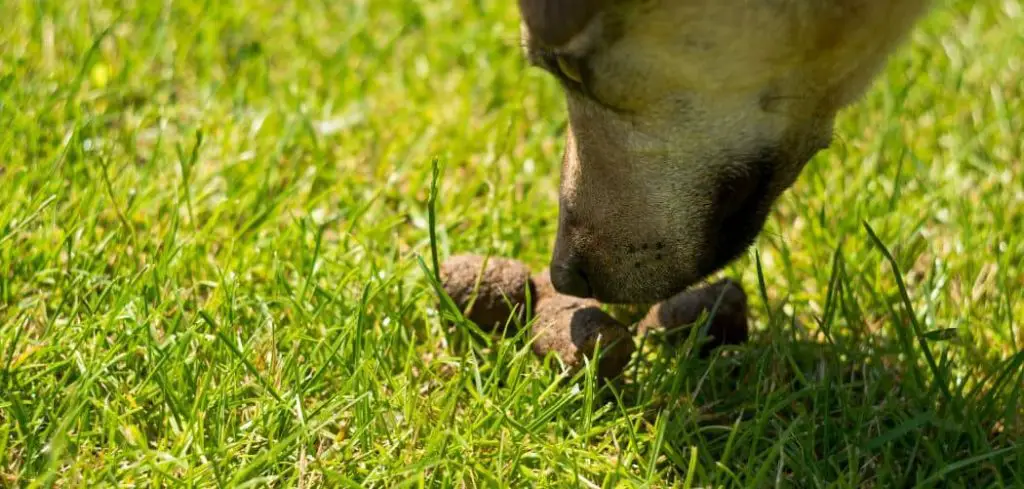Seeing poop that looks like jelly in an old dog can be alarming for any pet parent. This unusual stool texture often signals irritation or inflammation in the digestive tract and should not be ignored.
We outline the common causes of jelly-like poop in old dogs, what you can do at home, and when to seek veterinary help.
Old Dog Poop Like Jelly — Why It Happens
Jelly-like poop in an old dog usually happens when mucus is produced in the intestines due to irritation or inflammation. This can be triggered by dietary changes, infections, parasites, colitis, or more serious conditions like cancer. Because senior dogs have more sensitive digestive systems, even minor issues can show up in their stool.
While some cases may resolve on their own, persistent or severe jelly-like poop should always be taken seriously, especially if it is accompanied by blood, diarrhea, or weight loss.

Old Dog Poop Like Jelly: Common Causes
Colitis
Colitis is inflammation of the colon and is one of the most common reasons for jelly-like poop in dogs. The inflammation causes the colon to produce excess mucus, which coats the stool and gives it a jelly appearance.
Dogs with colitis may also strain to defecate, pass smaller amounts of stool, or show signs of discomfort when going to the bathroom.
In old dogs, colitis can result from stress, infections, or food intolerance. If left untreated, it can become chronic and significantly impact their quality of life.
Read more: Old Dog Pooping Blood and Mucus (Explained)
Dietary Indiscretion or Sudden Food Changes
Older dogs have more delicate digestive systems than younger ones. A sudden switch in food or eating something unusual can irritate the gut lining, causing mucus production.
If your old dog sneaks into the trash or eats table scraps, their system may respond by producing jelly-like stool as a protective mechanism.
While mild cases may clear up once the diet stabilizes, recurring issues suggest a deeper sensitivity that may require a veterinarian’s input.
Intestinal Parasites
Parasites such as whipworms or giardia can cause mucus-filled, jelly-like stools in old dogs. These parasites irritate the intestinal lining, leading to inflammation and abnormal stool consistency.
Because aging dogs often have weaker immune systems, they may not fight off parasites as easily as younger dogs.
Other symptoms may include diarrhea, weight loss, and general lethargy. Regular fecal testing is important in older pets to catch these issues early.
Infections
Bacterial or viral infections can disrupt normal digestion and cause excess mucus in the stool.
Infections often bring additional symptoms such as vomiting, diarrhea, or loss of appetite.
An old dog with a weakened immune system may not recover as quickly and may be at greater risk for dehydration or secondary complications. Prompt veterinary care is needed if an infection is suspected.
Inflammatory Bowel Disease (IBD)
Inflammatory bowel disease is a chronic condition where the intestines overreact to food or bacteria, leading to ongoing inflammation.
In old dogs, IBD often manifests with jelly-like stool, diarrhea, weight loss, and reduced appetite.
Because it is a long-term issue, it requires veterinary management through diet changes, medications, and sometimes supplements. Left untreated, IBD can seriously reduce an old dog’s comfort and health.
Cancer or Tumors in the Digestive Tract
Unfortunately, in senior dogs, jelly-like poop can sometimes be linked to cancer in the digestive system.
Tumors in the intestines or colon can cause bleeding, mucus, and changes in stool consistency.
This is more concerning if the stool also contains visible blood, if weight loss is present, or if appetite has sharply declined. Early diagnosis is essential, as some cancers can be managed or slowed if caught early.
What to Do If Your Dog Has Poop Like Jelly
If your old dog passes jelly-like stool, start by observing them carefully for additional symptoms such as blood in the stool, lethargy, vomiting, or changes in appetite.
A single isolated episode may not be alarming, especially if your dog otherwise feels well, but repeated episodes need attention.
At home, ensure your dog stays hydrated, since digestive upset can cause fluid loss. Feeding a bland diet of boiled chicken and rice for a couple of days may help calm the digestive system if the symptoms are mild. Avoid giving treats or fatty foods until stools return to normal.
Monitor their bathroom habits closely and note any changes in frequency, color, or consistency.
Keep track of whether jelly-like stool appears with diarrhea, straining, or pain, as this information is very helpful for your veterinarian.
Do not attempt to treat with over-the-counter human medications, as many are toxic to dogs. Instead, focus on supportive care and contact your vet if the symptoms don’t resolve quickly.
When to Call or Visit Your Vet
You should call your vet promptly if your old dog’s jelly-like stool persists for more than a couple of days, recurs regularly, or is accompanied by blood, vomiting, or lethargy. These may indicate a more serious condition than simple dietary irritation.
Immediate veterinary care is needed if your dog becomes weak, refuses to eat, or shows signs of dehydration such as sunken eyes or dry gums.
Because old dogs are more vulnerable, they can deteriorate quickly if digestive issues are not treated.
Your veterinarian may recommend stool tests, blood work, or imaging to pinpoint the cause. Early intervention often makes treatment easier and improves your dog’s chances of recovery.
Read more: Old Dog Diarrhea (Understanding the causes)
Key Takeaway
Jelly-like poop in an old dog usually signals irritation or inflammation in the digestive tract, but it can also point to serious conditions like parasites, infections, or even cancer.
While a single episode may not be alarming, persistent or worsening symptoms require veterinary attention.
As a dog parent, your role is to observe, provide gentle supportive care, and act quickly if the problem doesn’t improve. With prompt attention, many underlying causes can be treated or managed, helping your senior dog stay comfortable and healthy.
